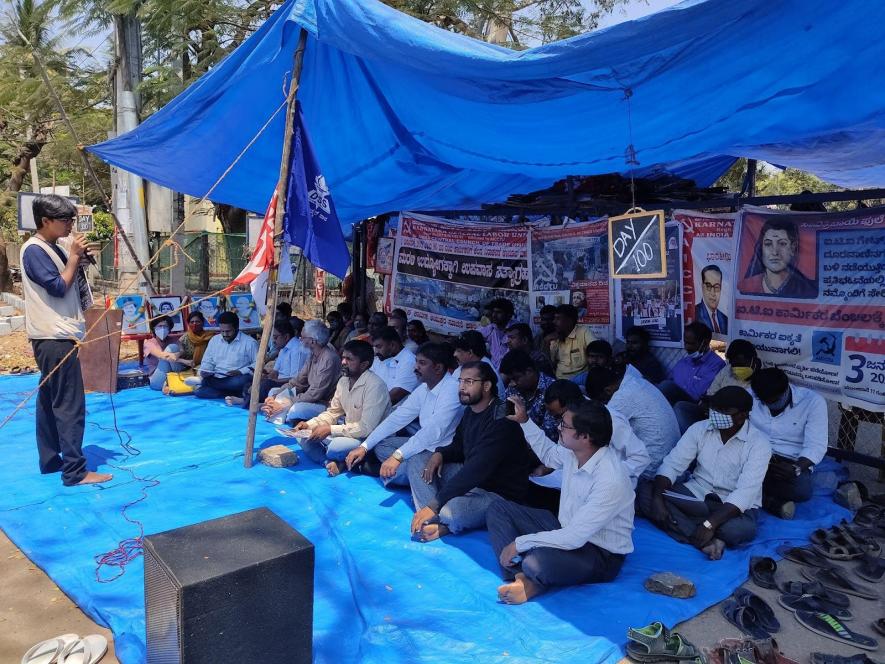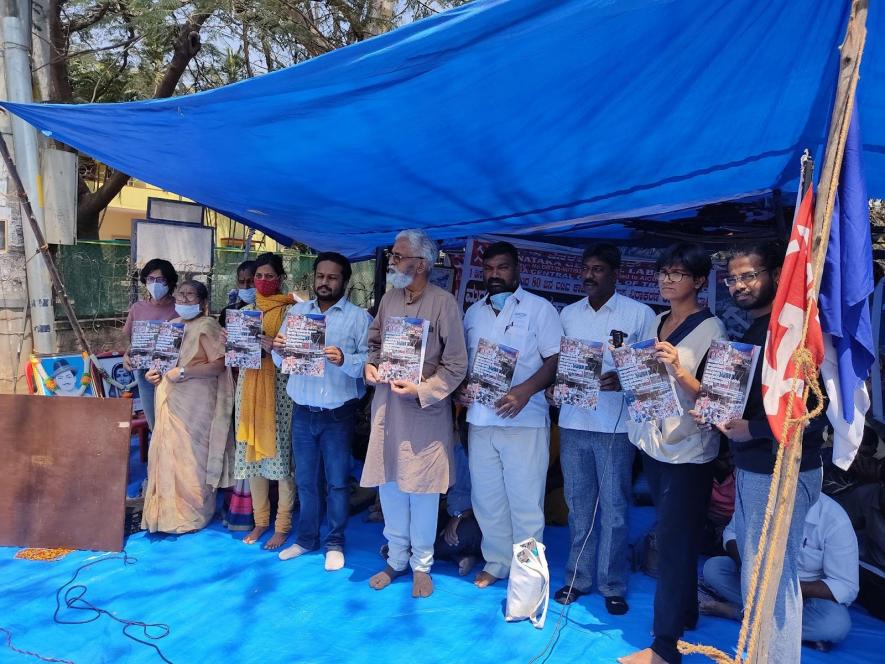‘We Want Justice’: Protest by Sacked ITI Bengaluru Workers Enters 100th day

ITI employees on the 100th day of their protest against their sacking at Doorvani Nagar.
The site where the sacked employees of the Indian Telephone Industries (ITI) Bengaluru are protesting their termination resonated with the slogans of ‘We want Justice’ and ‘Inquilab Zindabad’ on the 100th day of the protest on March 10. Away from their families for more than three months, the employees continue to protest under tarpaulin sheets at Doorvani Nagar.
The 100th day of the protest was marked by the presence of a fact-finding committee that released a report titled ‘Fact Finding Report on the Unlawful Termination of Workers at ITI, Bengaluru’ which presents the sequence of events and the timeline before and after the termination of the employees. Representatives of the National Alliance for People’s Movement and the Dalit Sangharsh Samity were also present to express solidarity with the employees.
The report also mentions the testimonies of contract workers, the need for a union and lists out a charter of demands of the employees submitted to the management on October 15, 2020.

The fact-finding team releases the report, titled ‘Fact Finding Report on the Unlawful Termination of Workers at ITI, Bengaluru’ at the protest site.
According to the 25-page report, the members of the committee “feel that the struggle of the ITI workers in the face of such adversity is an ode to resilience and the claims for constitutional rights, fairness, inclusion, and citizenship. Industrial workers’ struggles and farmers’ struggles cannot be disconnected: they are both parts of a broader political-economic trend that is concentrating wealth and power upwards in the hands of elite corporate management, both public and private”.
The report further states that “despite providing emergency services during the first Covid wave in 2020, ITI downgraded contract workers from ‘skilled’ to ‘unskilled’ soon after based purely on their level of education, not experience”.
As one contract employee mentions in the report: “Suddenly, I became unskilled [from skilled] ... In a month, I was making about Rs 5,000 less than before. We thought that since we have been working here for so long it is okay. We realised only later that we have been working like slaves and not even asking for what they are supposed to give us.”
The members mentioned how “coded discrimination, disproportionately affecting women and people from marginalised castes and classes, is a key feature of the contract labour system—a fact that must be recognised by the broader public”.
Akash Bhattacharya, one of the committee members, told the workers that “we are passing through tough times wherein protests and movements are castigated as crime and anti-social by the government of the day. It enabled the brutality on workers, which needs to be confronted with all strength and means. So, releasing the report on the 100th day is a gesture of solidarity and support to the workers of the ITI”.
Juhi Tyagi, another committee member, lauded the employees for demanding justice and said that the report is a way of “reinforcing the fighting spirit against the exploitation unleashed by the ITI management”.
In a study on the caste, class, gender, and linguistic backgrounds of ITI employees, sociologist Dilip Subramaniam found that the PSU—mandated to have reservation for six marginalised castes—had provided an avenue for modest upward mobility of Dalit workers. In the first few decades, the PSU hired migrants from landless SC communities in Karnataka, Tamil Nadu and Andhra Pradesh. But more than half of the terminated contract workers belong to the backward castes, like SCs and STs.
Karnataka General Labour Union ITI unit president Hemanth said, “Our socio-economic vulnerability is the biggest threat to our existence and those responsible for it reaped a whopping profit of Rs 111 crore in 2018-19. Now, the management is fudging figures to show that production has been low. Specifically, the termination has obstructed the social upward mobility of workers from SCs and STs.”
One of the sacked employees Praveen said that the ITI management had “promised to take back 40 workers after the Karnataka labour minister’s visit to the factory. But the very next day, in the first week of March, the company “reneged on its promise during the court hearing”, he alleged.
The protest has been lauded by worker unions across various sectors. In mid-February, renowned social activist Medha Patkar visited the workers, praised them for their determination and lashed out at the ITI for “exploiting” them. In the last week of February, 800 people attended an ITI workers convention organised by farmers and Dalit organisations.
The ITI Solidarity Group—comprising human rights lawyers, journalists, labour economists, sociologists, teachers and concerned citizens—sent a letter dated February 7 to Union labour minister Bhupendra Yadav highlighting the chronology of “institutionalised injustice” meted out to the employees.
The writer is a freelance journalist.
Get the latest reports & analysis with people's perspective on Protests, movements & deep analytical videos, discussions of the current affairs in your Telegram app. Subscribe to NewsClick's Telegram channel & get Real-Time updates on stories, as they get published on our website.
























